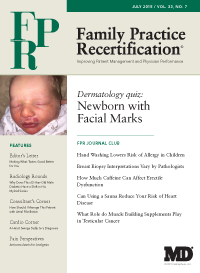Publication
Article
Family Practice Recertification
Hand Washing Lowers Risk of Allergy in Children
Author(s):
Using a questionnaire based survey of children from Scandinavia, these authors correlated asthma, eczema, and rhino-conjunctivitis, and found lower rates of these outcomes in those who hand washed as opposed to those who machine washed their dishes.
Review
[
2015 Mar;135(3):e590-7]
Allergy in children in hand versus machine dishwashing Pediatrics.
Summary
Using a questionnaire based survey of children from Scandinavia, these authors correlated asthma, eczema, and rhino-conjunctivitis, and found lower rates of these outcomes in those who hand washed as opposed to those who machine washed their dishes.
Study Method
One thousand children aged 7-8 from Sweden were evaluated for atopic disorders including asthma, eczema, and rhino-conjunctivitis. Also obtained was parental history of asthma, atopic dermatitis, or allergic rhino conjunctivitis. Eating habits were queried as was dish-washing practices. Concerning foods consumed, fermented foods, the origin of foods (i.e., were they based from farms or from a grocery store), frequency of home cooking, and length of breast feeding were all correlated with pediatric atopic disease. A detailed process was utilized to identify and reduce the influence of confounding variables.
Results
Of the approximately 1,800 questionnaires distributed, just over 1,000 were returned. Approximately 47% of the pediatric population was male. Interestingly, tobacco smoke exposure was uncommon (approximately 4%) during the first year of life and approximately 6% of mothers smoked during pregnancy. Pet exposure was also less than 30% during pregnancy and the first year of life. Ninety-one percent of all of the children included in this study attended day care. Approximately 85% of the homes used machine dishwashing to clean their dishes, while only 12% reported hand dishwashing.
Outcomes
Hand dishwashing was associated with a reduced risk of allergic disease development (odds ratio = 0.57; 95% CI: 0.37-0.85). The risk was further reduced in a dose response pattern if the children were also served fermented food, and if the family bought food directly from farms.
Conclusions
In Swedish families who use hand dishwashing, allergic disease in children was less common than those that used machine dishwashing.
Discussion
The rates of atopic disorders have continued to increase in the western world over the last 50 years. Multiple theories have been raised to explain this, including the role of affluence societies having higher intakes of processed foods, lower intakes of foods from their original sources, and tools and equipment that alter food preparation and delivery.
The authors of this article theorize the high efficiency and chemicals used in machine dishwashing are more likely to remove any residual agents from the dishes and utensils than when it is done by hand. This residual matter may alter the exposure of children to a variety of antigens and the authors further speculate that it may alter the gut microbial flora. Fermented food also seemed to play a role outcome and this increased the speculation that gut flora may influence the development of atopic disease in children.
Previous data has demonstrated that children raised on farms (where food in its natural state) have lower rates of allergy development than those raised in suburban or urban settings. But asking a family to move to a farm setting or to obtain their food from these sources solely to prevent atopic disorders may be difficult, and impractical. How dishes are cleaned can be recommended, especially to those families who are at high risk of atopic disorders.
Previous studies have led the American Academy of Pediatrics to recommend breast-feeding for 9 or more months to lower asthma risk. They also recommend delaying the introduction of cereals until after 6 months of age to decrease the risk of asthma allergic rhinitis, and recent data encourages parents to introduce eggs and fish before 11 months of age (Journal Allgry Clin Immunol. 2013; 131:78-86).
This observational study found an inverse association between hand washing dishes and the lower incidence of atopic disorders. It used a series of statistical methods to lower the risk of confounding variables, but, as this is not a randomized control trial, the conclusion that hand washing of dishes will prevent asthma or other atopic disease cannot be made. Until more research is done, it seems reasonable to encourage parents, especially those with a strong family history of atopic disorders, to hand wash vs. machine wash their dishes and encourage the inclusion of some fermented foods in their children’s diet before age 8. Whether unpasteurized dairy products can be recommended requires a weighing of the risks and benefits and was not within the scope of this study.
This study helps us understand that something about exposure in early life increases the risk of certain outcomes and may encourage us to advise parents on how their behavior can ultimately lead to lower health risks in their children.




